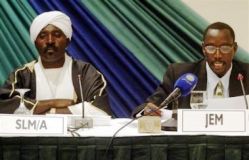Darfur rebels reject AU power-sharing proposals
Dec 2, 2005 (ABUJA) — Darfur Rebel leaders rejected an African Union draft agreement on power-sharing between their forces and the government in Khartoum, pushing the sides’ seventh session of peace talks close to stalemate.
 Rebel leaders from the western Sudanese region of Darfur rejected an African Union draft agreement on power-sharing between their forces and the government in Khartoum, pushing the sides’ seventh session of peace talks close to stalemate.
Rebel leaders from the western Sudanese region of Darfur rejected an African Union draft agreement on power-sharing between their forces and the government in Khartoum, pushing the sides’ seventh session of peace talks close to stalemate.
“The Justice and Equality Movement (JEM) and the Sudanese Liberation Movement (SLM) are working together now on the issue of power-sharing because it is very crucial to us,” JEM spokesman Ahmed Hussain Adam told AFP at the peace talks in the Nigerian capital Abuja.
“The position of the African Union and the Sudanese government on the subject is totally unacceptable to us … We cannot compromise on these issues. They will make or break this round of talks,” he warned, as delegates gathered for an evening session.
Specifically, the rebels object that the document does not provide for consolidating Darfur — currently divided into three provinces — into a single region and does nothing to prevent both Sudan’s president and vice-president from being from the north at the same time.
The day the rebels warned of “no compromise,” the top UN envoy for Sudan, Jan Pronk, expressed prudent optimism for a settlement by the end of the year, saying: “The parties are far apart still, but they came, which is already a victory.
“And it is possible that there will be a peace agreement at the end of this year, like last year on December 31 we had peace between the north and the south,” he added in Geneva, referring to the deal that ended two decades of civil war in south Sudan.
Nonetheless, the UN secretary general’s special envoy for Sudan said other “people still roaming around in Darfur,” including bandits, former government allies the Janjaweed and other militia, would still need to be reined in after any accord in Abuja.
“We will also after the peace have to start a process of inclusive talks for all of the population and their representatives in order to address the root causes of the conflict,” Pronk said after attending the first days of the renewed direct talks.
AU officials said the rebels had been invited to bring their concerns about the draft power sharing deal to a joint negotiation session later Friday, after the dispute stalled progress in the side committee set up to hammer out a deal of dividing power between Khartoum and Darfur.
The row over the power-sharing agreement came just three days after the long-running talks restarted and was the first sign that this round could fall into the same stalemate as all previous attempts to resolve a 33-month-old crisis which has left 300,000 civilians dead.
Previous negotiations were undermined by regular ceasefire violations, and the United Nations has warned the Darfur region is falling into chaos, with murder, robbery and rape on the increase.
Pronk underlined that though there had been a rift within rebel ranks, the overall political climate had improved significantly since a six-year interim government of national unity was set up in the summer under the north-south peace deal, easing the search for a solution in Darfur.
War broke out in February 2003 when the rebels began fighting what they say is the political and economic marginalization of the region’s black African tribes by the Arab-led regime in Khartoum.
The African Union has deployed a small peacekeeping force to monitor a shaky ceasefire, but a series of peace conferences over the past year has made little progress towards a settlement.
(AFP/ST)
